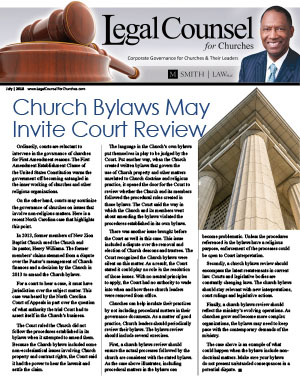For many churches, parking can be a challenging issue to manage. There may not be enough parking and enforcement becomes a necessary practice. In some instances, access onto a main street of traffic can cause safety issues for its members and the public. Church leaders should understand what authority they have to regulate the flow of traffic on church property.
North Carolina law allows the governing body of any religious organization to establish rules and regulations with respect to the use of the streets, roads, alleys, driveways, and parking lots on the grounds or premises owned or under the exclusive control of such organization. To do so, the church leadership should be aware of what limitations exists in creating traffic rules.
The law states that a church must pass an appropriate resolution to effect such traffic rules. The resolution should be approved by the governing body of the church. If the church’s policies are generally approved by a governing body, that same group should review, consider and vote the approval of the parking rules. In addition to the church approving the traffic regulations, the church must file copies of its traffic regulations in the office of the Secretary of State of North Carolina.
Here are some of the activities North Carolina law allows a church to regulate with its traffic rules:
- It shall be unlawful for any person to
park a motor vehicle or other vehicle on the streets, roads or on the premises of a religious assembly where parking has been prohibited by the religious assembly by the erection of “No Parking” signs at each space on the street, road or on the premises where parking is prohibited. Each space in which parking is prohibited must be clearly designated as such by a sign no smaller than 24 inches by 24 inches. - It shall be unlawful for any person to park a motor vehicle or other vehicle in a parking space on the streets, roads, or premises of a religious assembly where the parking space has been designated by the religious assembly as being limited to a named individual or to a person holding a named position with the assembly. The parking space must be clearly designated and marked by a sign no smaller than 24 inches by 24 inches.
- It shall be unlawful for any person to park a motor vehicle or other vehicle on the streets or roads of a religious assembly, except where parking is expressly designated, so as to interfere with, or obstruct the free flow of vehicular traffic on the streets or roads within the assembly grounds.
- It shall be unlawful for any person to park a motor vehicle or other vehicle at the entrance to any driveway on the grounds of a religious assembly so as to block the driveway.
- The church may remove any vehicle parked in violation of its posted regulations. Removal may be conducted by the church, or its agents, or its employees to a place of storage. The registered owner of such motor vehicle shall become liable for removal and storage charges. The law provides immunity from civil liability that may be alleged by the vehicle owner, lienholder or other person legally entitled to the possession of the vehicle removed. The immunity does not apply if an agent of the church intentionally or negligently damages a vehicle in the removal of such vehicle, or intentionally or negligently inflicts injury upon any person in the removal of such vehicle.
Parking can be a headache for churches during services. If your church faces challenges with parking in and around your facilities, you should take a close look at your parking rules to see if you have appropriate guidance in place.

